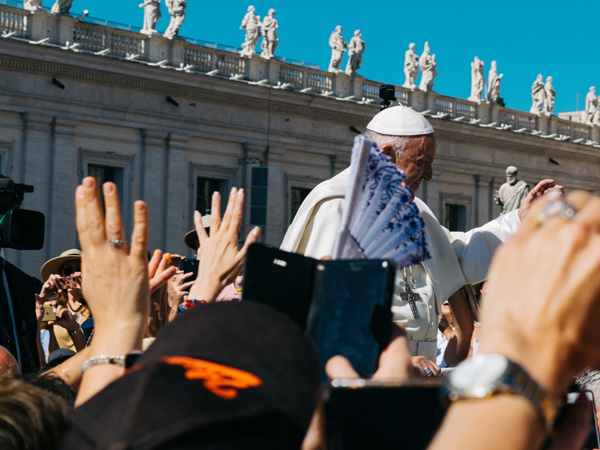Pope Francis criticizes both Trump and Harris in U.S. politics

[Photo Credit to Unsplash]
Pope Francis recently criticized both major American political figures, Donald Trump and Kamala Harris, for their stances, which he views as contrary to the sanctity of life.
This sharp rebuke came during his return flight to Italy after a diplomatic tour across four countries in Asia and Oceania, reported by CNN.
During an airborne press conference, Pope Francis was asked to offer advice to Catholic voters in the upcoming U.S. presidential election.
He responded by highlighting the moral conflicts presented by the policies of both Trump and Harris—specifically, Trump's harsh immigration policies and Harris' support for abortion rights.
While he did not name them directly, the implications of his criticisms were clear given their well-known positions.
Pope Francis emphasized that the act of deporting immigrants conflicts with the Biblical command to welcome the stranger, a fundamental Christian duty.
He argued that failing to extend hospitality and protection to those in need constitutes a serious sin.
Furthermore, he reiterated his longstanding position that abortion is equivalent to murder, a view that aligns with traditional Catholic teachings.
The Pope's comments reflect his consistent approach to blending spiritual leadership with commentary on global political issues.
He expressed concern that both policies endorsed by Trump and Harris represent a threat to life, urging voters to consider the moral implications of their choices.
"Both actions oppose life," Pope Francis stated firmly.
"One must choose the lesser of two evils in such situations, and it is essential for people with a conscience to think and act accordingly."
Historically, Pope Francis has not shied away from addressing controversial issues directly.
In 2016, he famously criticized Trump’s proposal to build a wall along the U.S.-Mexico border, questioning the Christian faith of someone who prefers building walls instead of bridges.
In 2018, he harshly criticized the practice of abortion, comparing it to hiring a hitman to solve a problem.
Beyond his criticisms of U.S. politics, Pope Francis also addressed broader issues during his trip.
He condemned the recent Israeli airstrikes on Lebanon as exceeding moral boundaries.
He articulated this stance while speaking to journalists during his flight back from Belgium, emphasizing that even in warfare, there are moral laws that must be observed.
"War itself is immoral, but if it must occur, it should adhere to certain moral guidelines," Pope Francis explained.
He highlighted the principle of proportionality in defense, arguing against actions that disproportionately harm civilians.
He stressed that all nations should strive to minimize harm to civilian lives and infrastructure, underscoring the importance of adhering to international humanitarian laws.
These discussions occurred amid a larger backdrop of increasing global conflict and humanitarian crises.
Pope Francis has often positioned himself as a mediator and voice of reason, advocating for dialogue and negotiation over violence.
His commitment to these principles is reflected in his calls for peaceful resolutions to conflicts worldwide, including urging nations to consider the long-term impacts of their military actions.
Pope Francis continues to engage with and challenge global leaders on critical ethical issues.
His teachings and statements aim to inspire Catholics and non-Catholics alike to reflect on the moral dimensions of political policies and their broader implications for humanity.
He urges leaders and individuals to consider how their decisions align with moral values and contribute to the common good.

- Taeung Han / Grade 10
- BC Collegiate

![THE HERALD STUDENT REPORTERS [US]](/assets/images/logo_student_us.png)
![THE HERALD STUDENT REPORTERS [Canada]](/assets/images/logo_student_ca.png)
